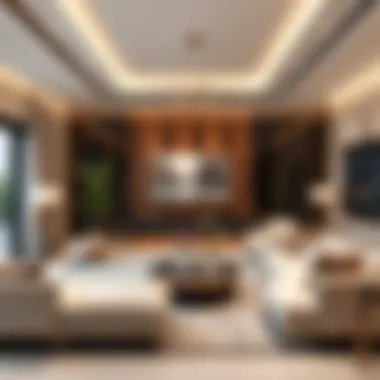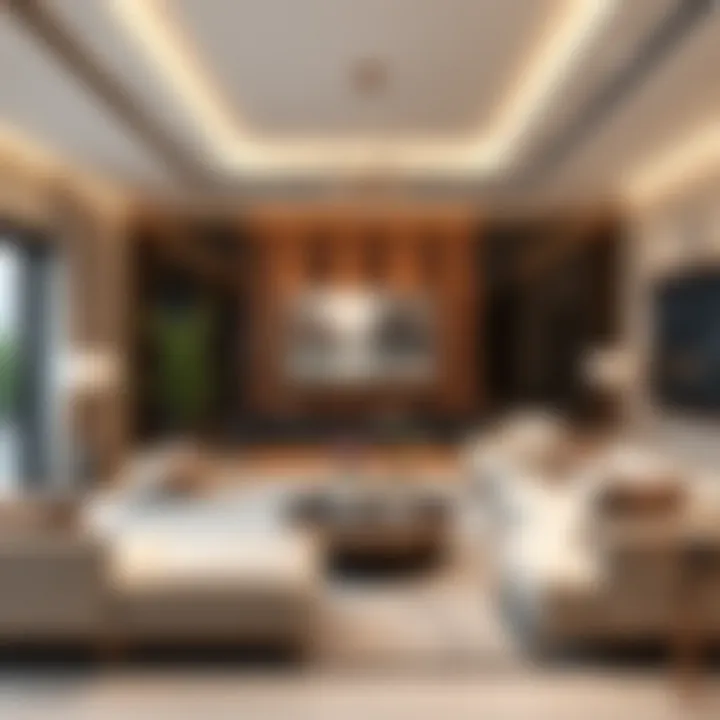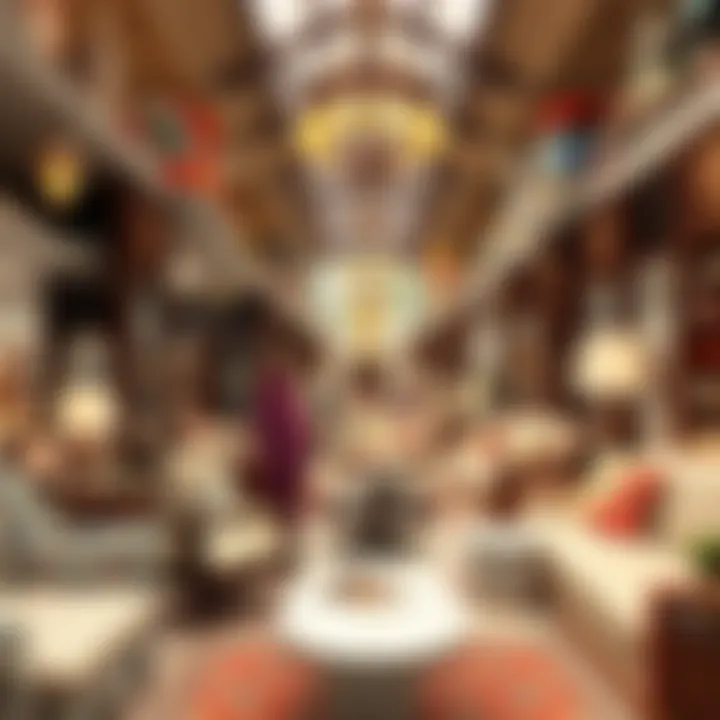Exploring Dubai's Furniture Market Trends and Tips


Intro
Dubai's vibrant scene is not just about skyscrapers and luxurious lifestyles. The furniture market here paints a captivating picture, reflecting not only the fast-paced development but also the rich cultural diversity that defines this city. As both local residents and international buyers look to furnish their homes, understanding this landscape can unlock a world of options, trends, and innovative designs.
The furniture sale ecosystem in Dubai is akin to navigating a bustling souk, where high-end designer pieces mingle with local craftsmanship. One can find everything from minimalist Scandinavian designs to ornate Middle Eastern styles, creating an eclectic mix that caters to varied tastes and preferences. This article unpacks the nuances of the Dubai furniture market, touching on key insights, purchasing strategies, and styles that resonate with the city's demographic.
Property Listings
When considering furnishing a home in Dubai, keep in mind that the scope of available pieces extends beyond mere aesthetics to also feature practical functionality and design relevance. Understanding property listings is crucial as they often highlight offerings that are not only stylish but also suited to specific lifestyles.
Detailed Property Features
Each property comes with unique features that can influence furniture selection. For instance, if a property boasts open-plan living areas, furniture selections will differ vastly from those made for smaller, more compartmentalized spaces.
- Space Utilization: Opt for multi-functional furniture that cuts down space requirements without sacrificing style.
- Material Matters: In Dubai's heat, materials such as light woods and fabrics that are breathable could be more appropriate.
High-Resolution Images and Virtual Tours
The digital age has transformed how we shop for furniture. Many retailers offer high-resolution images that allow buyers to envision how a specific piece fits within their personal spaces. Virtual tours have also revolutionized the experience, enabling buyers to explore showrooms without stepping foot inside.
A well-made choice in furniture today is an investment for comfort and style tomorrow.
Market Insights
To navigate the bustling furniture scene effectively, understanding current market insights is vital. Buyers should familiarize themselves with key trends and neighborhood profiles that can inform their choices.
Current Market Trends
The furniture market in Dubai is not static. It evolves with cultural preferences and seasonal demands. Recent trends include:
- Sustainable Furniture: There is a growing inclination towards eco-friendly materials and practices.
- Smart Furniture: Technology-enabled pieces that integrate with home automation.
Neighborhood Profiles
Understanding the neighborhoods of Dubai can guide furniture selections. For instance, a trendy area like Jumeirah Lakes Towers could favor modern, sleek designs, while older districts may lean towards traditional styles influenced by local artisans.
Ultimately, buyers should know their surroundings and target audience when purchasing furniture—be it for personal use or for investing in rental properties. This knowledge empowers one to make well-informed decisions that align with individual lifestyle and investment goals.
Closing Thoughts
As we explore the various aspects of furniture sales in Dubai, it becomes clear that making educated choices opens the door to a harmonious living environment. By delving into property features, knowing what the market offers, and understanding trends, potential buyers can confidently navigate Dubai's unique furniture landscape, achieving their desired aesthetic and functional goals.
Understanding the Furniture Market in Dubai
The furniture market in Dubai reflects the eclectic blend of cultures, aesthetics, and lifestyles that define the emirate. Understanding this market is pivotal not just for residents but also for expatriates and investors keen on capitalizing on one of the world's most dynamic furniture landscapes. The rich tapestry of influences ranges from traditional Middle Eastern styles to contemporary global trends, allowing buyers to find pieces that resonate with their identity and practical needs.
Historical Context of Furniture Trends
Historically, the furniture landscape in Dubai has evolved in concert with the rapid development of the city itself. In the early days, furniture was largely functional, catering to the basic needs of its inhabitants. Traditional Arabic designs, characterized by intricate carvings, natural materials, and vibrant colors, dominated the scene. As Dubai transformed into a global hub, the influx of international residents diversified the market significantly.
During the late 20th century, as the city embraced modernization, new trends emerged. Styles such as minimalist Scandinavian and bold contemporary designs began to make a mark, reflecting a shift towards aesthetic variety. The historical context of these transitions underscores how platforms like the Dubai Design Week or the INDEX Dubai trade fair foster an environment where both local crafts and global designs find a common ground.
Present State of the Market
Today, the furniture market in Dubai is a bustling spectacle, showcasing a comprehensive range of options that cater to every taste and budget. High-end stores showcasing luxury brands like Roche Bobois and Boca do Lobo exist alongside more affordable options from brands such as IKEA. This competitive landscape enhances choices for consumers, making high-quality and stylish pieces accessible to a broader audience.
Furthermore, the emergence of online shopping platforms has revolutionized the way consumers engage with the market. Websites like Home Centre and Mumzworld provide virtual showrooms that feature extensive product lines. Shoppers can browse thousands of options from the comfort of their homes, compare prices, and read reviews. The convenience of online shopping, combined with the allure of traditional physical stores, creates a rich, multifaceted shopping environment.
It’s also worth noting that the market is increasingly influenced by sustainability trends. Eco-conscious consumers are sparking a demand for sustainable options, prompting brands to innovate and offer environmentally friendly products. This trend reflects a broader societal shift towards responsible consumption, highlighting how modern buyers prioritize sustainability alongside style and functionality.
"In Dubai’s furniture market, the past informs the present, creating opportunities for everyone with an eye for style."
For further reading on Dubai's history and cultural influences, consider visiting Wikipedia or Britannica.
Key Factors Influencing Furniture Purchases
The intricacies of the furniture market in Dubai echo the diverse cultural tapestry of the city itself. Understanding the key factors that influence furniture purchases is crucial for discerning buyers looking to make informed decisions. In a marketplace bustling with options, knowing what drives consumer preferences can not only facilitate better choices but also highlight unique purchasing opportunities. Here are two essential elements that warrant closer examination:


Cultural Significance in Design
Dubai’s rich cultural landscape serves as a canvas for a myriad of furniture designs, reflecting both tradition and modernity. The architectural influences from Arabian aesthetics often meld seamlessly with contemporary styles, creating unique pieces that tell a story. When choosing furniture, many buyers consider how designs resonate with their heritage or lifestyle aspirations. This cultural significance is not merely superficial; it underpins the emotional connection individuals have with their living spaces.
For example, traditional Arabic designs may feature intricate carvings and vibrant colors that enhance a home’s ambiance, while minimalist styles appeal to those drawn to the sleek lines of modern living. Recognizing the cultural context of furniture choices can elevate the buying experience, turning a simple transaction into one that honors personal and communal histories. Understanding these cultural nuances also aids retailers in tailoring their offerings to meet the diverse preferences of both local residents and international buyers.
Economic Trends Affecting Pricing
Economic factors play a pivotal role in determining furniture pricing in Dubai. Amidst fluctuating market conditions, including shifts in demand driven by tourism and property developments, prices can vary significantly. Buyers must stay informed about these trends to make sound decisions. Factors such as import tariffs, material availability, and labor costs also directly influence prices.
Several recent trends are worth noting:
- Inflation has led to increased costs in production and importation, reflecting on retail prices.
- Consumer confidence affects purchasing power; when people are assured in their financial standing, they are more likely to invest in higher-quality, enduring pieces instead of opting for cheaper, temporary solutions.
- Sustainability trends have put pressure on manufacturers to explore eco-friendly materials, often at a premium price.
Awareness of these economic undercurrents allows buyers to strategize their purchases effectively. Tools such as market reports or consultation with local realtors can provide invaluable insights.
"The furniture you choose is more than a commodity; it’s an investment in your lifestyle, one that could either enhance or detract from your living environment."
In summary, delving into the cultural significances and economic trends is essential for anyone navigating Dubai's furniture landscape. These factors not only enrich the shopping experience but provide a foundation for making enlightened purchases that cater to individual needs and preferences.
Popular Furniture Styles in Dubai
The bustling city of Dubai is a mosaic of cultures, which inherently influences its furniture styles. Understanding these styles is vital for anyone looking to buy, sell or invest in furniture. Engaging with this dynamic landscape offers insights into what appeals to various demographics. Not only does this knowledge enhance a buyer's experience, but it can significantly impact the value of their investments in furnishings. With a variety of choices available, being informed can lead to better purchases that align with personal tastes and lifestyles.
Contemporary vs. Traditional
In the context of Dubai, contemporary furniture is often characterized by clean lines, minimalistic design, and a focus on functionality. Many modern homes favor this style, as it resonates well with the fast-paced lifestyle of the city. On the flip side, traditional furniture finds its roots in the rich cultural history of the region. It incorporates intricate designs, textures, and materials that reflect the artistry of Middle Eastern craftsmen.
Comparing these two styles, contemporary pieces may often be made from materials such as metal and glass, creating a sleek look. Meanwhile, traditional furniture often includes embellishments like mother-of-pearl inlays and wooden carvings. Hence, buyers are faced with a choice: do they want a modern touch or a piece steeped in history?
Furthermore, the choice of furniture style can significantly influence the ambiance of a home. A traditional Sultan-style majlis provides a warm, inviting atmosphere, while a contemporary open-plan living space promotes a feeling of airiness and sophistication.
Sustainable and Eco-Friendly Options
With growing awareness about environmental issues, many buyers are now leaning towards sustainable and eco-friendly furniture options. Dubai has seen a rise in green furniture stores that prioritize ethically sourced materials and methods. Many consider these choices not just as a trend, but as a responsible step towards preserving the planet.
Sustainable furniture often utilizes reclaimed wood or materials with low environmental impact. What’s more, this style can bring a unique aesthetic to a living space, infusing it with character and soul. Investors should note that sustainable furniture can be appealing to a demographic increasingly focused on eco-conscious living.
Furthermore, buyers may also find that sustainable options can often be quite durable. This is not only beneficial for the environment, but can also save costs in the long run due to reduced need for replacements.
Luxury vs. Budget-Friendly Choices
Dubai is known for luxury, with high-end furniture brands offering extravagant options for those willing to splurge. Designer pieces from brands like Restoration Hardware and Baker Furniture can transform a space into something visually stunning. These luxury items often promise unparalleled quality, craftsmanship, and exclusivity. However, they come with a hefty price tag, which may not be feasible for every buyer.
On the other end of the spectrum, budget-friendly furniture options can also provide stylish and functional solutions without breaking the bank. Stores like IKEA and Home Centre offer a variety of selections that cater to those looking for both affordability and style. For savvy investors, understanding the balance between luxury and budget options is crucial.
Ultimately, the choice between luxury and budget-friendly items rests on personal priorities. Budget-oriented buyers should focus on the longevity and flexibility of pieces, considering how well they can fit into various interior schemes.
With such a variety of options available, Dubai’s furniture market caters to all tastes and needs, reflecting its diverse population. Whether drawn to modern elegance, traditional beauty, sustainability, or a keen eye for value, understanding these popular styles is critical for making an informed decision.
Shopping Venues in Dubai
Navigating the vibrant and diverse furniture sale landscape in Dubai hinges significantly on one factor: shopping venues. The choices available to buyers are not just about browsing; they reflect the unique blend of culture, creativity, and commerce that defines Dubai. Understanding where to shop can lead to discovering hidden gems and unique styles that resonate with both local tastes and international trends.
Notable Furniture Stores
Among the plethora of furniture stores that line Dubai’s streets, three stand out as veritable must-visits:
- IKEA Dubai
This globally recognized brand isn’t just popular for its affordability; it's a one-stop-shop for many families and individuals adjusting to life in the emirate. Its spacious showroom provides ample space to explore furniture options that cater to every taste – from minimalist to maximalist. Moreover, utilizing their in-store design tools can streamline the often cumbersome task of selecting furniture that fits unique spatial requirements. - Home Centre
Home Centre offers a blend of stylish yet functional furniture, tailored to the urban lifestyle prevalent in many Dubai neighborhoods. The variety speaks to modern sensibilities while offering a touch of traditional flare. What sets this store apart is its commitment to periodic sales and promotions, which savvy customers often await. - Herman Miller
Focusing on premium office and modern furniture, Herman Miller is another sanctuary for discerning buyers. With a range that promotes ergonomic design, it targets both individuals seeking home office solutions and businesses looking to invest in their workspace. The combination of design and functionality here places this store in a league of its own.
"Dubai isn't just about towering skyscrapers; it's about how people live, and furniture is a big part of that."
Online Shopping Platforms
In an age where convenience often trumps tradition, online furniture shopping platforms have gained traction among Dubai’s busy residents. Here are key players that have made waves in this domain:
- Souq.com: As the largest e-commerce platform in the Arab world, Souq.com has revolutionized shopping in the Middle East. With a separate section dedicated to furniture, buyers have a range of options at their fingertips, often with reviews from other customers that factor into the decision-making process.
- Noon: This rising e-commerce challenger offers both local and international brands. The user-friendly interface, coupled with the option for same-day delivery, makes it a competitive choice for impulsive buyers looking to furnish their homes quickly.
- Amazon.ae: With its vast catalog, Amazon offers everything from the latest styles to second-hand deals. Its international reach can sometimes provide unique finds that are less accessible in physical stores around Dubai.
Guidelines for Making Smart Purchases


Making a smart purchase in Dubai’s crowded furniture market is quite similar to navigating a busy souk—there are treasures to find, but it requires a discerning eye and a thoughtful approach. In this bustling metropolis, buyers face numerous choices, from locally crafted pieces to international imports. Therefore, having guidelines that steer your purchasing decisions can save both time and money, not to mention assist in securing furniture that perfectly matches your taste and practical needs.
Evaluating Quality and Durability
When it comes to buying furniture, quality should never take a backseat. It’s essential to assess both the craftsmanship and the materials used in the pieces you’re considering. Here are a few aspects to keep in mind when evaluating quality:
- Material Selection: Solid wood furniture, for instance, often promises longevity. Softwoods can be less durable, while hardwoods like teak or oak often withstand the test of time. Curious about the origin? Ask about how the wood is treated. Single boards versus engineered wood can also hint at durability.
- Joinery Techniques: Look beyond the surface finish. Quality furniture often incorporates sturdy joinery methods, such as dovetail joints, rather than staples or glue, which can mean a piece will withstand years of use without falling apart.
- Finishing Touches: Don’t underestimate the importance of finishes. High-quality varnish or lacquer not only enhances appearance but also provides a protective layer against scratches and moisture.
To truly gauge a piece’s durability, it’s wise to test it firsthand. If possible, try sitting on the chair or opening and closing drawers on desks. This tactile approach offers insights that mere photographs can’t convey.
Understanding Return Policies
Navigating the return policies is akin to reading the fine print in a contract. Understanding these policies is critical in establishing a sense of security in your purchase. Here are key points to consider:
- Length of Return Period: Is it 14 days or perhaps a month? Knowing how long you have to decide if a piece fits well in your home is essential. Some stores may offer generous return windows, which can be quite valuable.
- Conditions for Returns: Certain items, like custom-made furniture or clearance items, may be non-returnable. Knowing this beforehand can prevent buyer’s remorse.
- Restocking Fees: Some retailers might charge a fee for returned items. If a couch doesn’t fit your living space after all, this fee can be an unwelcome surprise.
"Knowledge is power, and this applies just as much in furniture shopping as in anything else."
If you’re considering a buy where the return policy feels a bit fuzzy, don’t hesitate to ask questions until you feel comfortable. Read reviews or solicit feedback from others who have shopped at the same store to get a clearer picture.
By honing your skills in evaluating quality and understanding return policies, you empower yourself to make purchases that not only enhance your living space but also bring peace of mind. Investing smartly in furniture within Dubai’s vibrant market requires more than just a beautiful aesthetic—it necessitates a partnership with quality and savvy consumer practices.
The Rental Market and Its Impact
In the bustling metropolis of Dubai, the rental market for furniture has emerged as a significant facet of the overall landscape. This trend reflects not only the diversity of the city's inhabitants but also changing lifestyles and economic frameworks. Understanding the intricacies of the rental market can offer advantages to expatriates, investors, and property developers alike. The opportunity to rent furniture allows individuals to adapt more easily to the transient nature of living in Dubai, where many professionals find themselves moving frequently due to work assignments.
As the demand for flexible living solutions rises, so does the rental furniture market. This section explores the growing demand and the benefits of renting versus buying furniture in Dubai.
Growing Demand for Rental Furniture
The allure of renting furniture goes beyond mere convenience; it taps into the evolving habits of a globalized workforce.
- Transitory Professionals: Many expatriates arrive in Dubai for contract work or short-term assignments. They often prefer renting to avoid enormous upfront purchases and the hassle of moving furniture.
- Urban Mobility: With the increasing popularity of micro-living and co-working spaces, rental furniture fits the mold of flexible living arrangements. Individuals and families can furnish their homes without commitment, allowing each to tailor their space to their immediate needs.
- Value for Money: For many, investing in high-end furniture can be a burdensome expense. Instead, renting allows individuals to enjoy quality furnishings without the high price tag, making it a practical choice.
Additionally, many rental companies offer furniture packages specific to various tastes and needs. From contemporary aesthetics to traditional designs, the growth in rental options reflects the rich tapestry of Dubai's population.
Benefits of Renting versus Buying
When considering whether to rent or buy furniture, it’s essential to weigh the benefits carefully. Here are several advantages of choosing rental furniture:
- Cost-Effectiveness: Renting furniture tends to be less expensive than purchasing. Especially for those on temporary assignments, it sometimes translates into significant savings.
- Flexibility: Renting offers the freedom to switch styles or upgrade without the headaches associated with selling unwanted pieces. This adaptability is especially advantageous in a vibrant market like Dubai.
- Maintenance-Free: Typically, rental companies handle any wear and tear issues, sparing renters from the responsibilities of upkeep.
- Immediate Availability: Most rental services provide immediate access to furniture. This ease allows new arrivals to set up their homes quickly without waiting for deliveries or navigating store inventories.
- Social Responsibility: For some environmentally-conscious consumers, renting prevents the wastage associated with buying and disposing of furniture over time.
Renting furniture really opens up a world of options. It’s about convenience and making the most of what this dynamic city has to offer. Flexibility is key, especially for those who may not stay long.
Furniture Trends Influenced by Technology
The intersection of technological advancement and the furniture market in Dubai is not merely an afterthought; it’s becoming a cornerstone of how consumers engage with their living spaces. As both residents and expatriates in this vibrant city navigate their furniture options, it’s imperative to understand how technology influences not only the style but also the functionality of pieces available in the market. Today's furniture is designed not only to beautify homes but also to meet the rising demand for efficiency and convenience, tailored to the fast-paced lifestyle of urban dwellers.
Smart Furniture Innovations
In recent years, the emergence of smart furniture has caught the interest of buyers keen on blending style with advanced technology. Imagine a sofa that adjusts its firmness based on the time of day or a desk that reminds you to stand after prolonged hours of sitting. Companies in Dubai have started integrating these features into their offerings, responding to a growing consumer interest.
- Smart beds that track sleep patterns and adjust automatically for comfort.
- Adjustable height desks for those fighting against sedentary office habits.
- Sofas equipped with wireless charging pads to keep devices charged and within reach.
These innovations appeal, especially to young professionals and families who prioritize a balance between aesthetics and utility. Additionally, these pieces often integrate with smartphone apps, creating an interactive experience that enhances the usage of household items. When purchasing smart furniture, buyers should consider the compatibility of such technology with existing home systems to ensure a cohesive smart home experience.
"With tech reshaping the industry, the furniture you choose can’t just be beautiful; it must also serve your connected life."
Augmented Reality in Furniture Shopping
Augmented Reality (AR) is another game-changer in the realm of furniture sales, particularly for international buyers or those new to the area. This technology allows customers to visualize how different pieces will look in their own homes before making a decision. By using AR apps, customers can transform their shopping experience:
- Visualization: Picture that sleek dining table or a modern coffee table in your space, scaled to size so you can see how it fits with your decor.
- Style Coordination: Match colors and styles to find the perfect combination without the hassle of moving heavy items.
- Convenience: Avoid the time-consuming back and forth of trying multiple pieces in-store.
The use of AR not only streamlines the shopping process but also builds confidence in purchasing decisions. As Dubai's market becomes more competitive, retailers are increasingly adopting such technologies to attract tech-savvy consumers looking for an enhanced shopping experience.
Tips for International Buyers


Buying furniture in Dubai can be a bit of a maze for international buyers. The vibrant market offers a vast selection, from modern designs to traditional craftsmanship. However, it also comes with its fair share of challenges, particularly around shipping and customs. This section aims to arm potential buyers with crucial insights into the buying process in Dubai, focusing on two key areas: shipping and handling, as well as navigating import regulations.
Understanding Shipping and Handling
When venturing into Dubai's furniture market, understanding the nuances of shipping and handling proves vital, particularly for those not familiar with local logistics. The first step is choosing reputable shipping companies. Look for firms that specialize in furniture transport and can provide transparent quotes, timelines, and insurance options.
- Consider shipping costs: Furniture can be bulky and heavy, making shipping fees a significant part of your budget. It's essential to factor in both initial costs and any potential additional fees that may appear later.
- Box and wrap: Proper packing can save heartache. Ensure that each piece is safely boxed or wrapped to avoid damage. Some sellers offer packing services, which might be worth the extra expense.
- Track your shipment: After your purchase, tracking services can help keep tabs on your items, showing you when they'll likely arrive.
"Shipping furniture internationally isn't just about the journey; it's about ensuring your pieces arrive in one piece."
Additionally, knowing the local delivery process in Dubai is just as critical. Sellers may provide delivery services, which can simplify your option. However, inquire about the specifics—like delivery timelines, assembly services, and extra charges—before completing the transaction.
Navigating Import Regulations
When importing furniture into Dubai, it’s crucial to understand the local import regulations. The laws often change, and ignorance can surprise even the most seasoned buyers. Here are key considerations:
- Duties and taxes: Depending on the value and type of furniture, various duties and taxes may apply. It’s prudent to consult with a logistics expert who understands the latest regulations.
- Documentation: Ensure that you have all necessary paperwork, such as purchase receipts and shipping invoices. Customs can require these documents to process the import smoothly.
- Prohibited materials: Some materials are restricted or require special permits. Always check what you’re importing to ensure compliance with local laws.
It can be beneficial to seek out professional advice or services that assist with customs documentation. In this regard, customs brokers can offer assistance by simplifying the process and ensuring all paperwork is accurate and timely.
Navigating the regulations can feel overwhelming, but being well-informed turns potential pitfalls into manageable hurdles. Proper preparation can significantly enhance your shopping adventure in Dubai and ensure a smooth journey from purchase to delivery.
Sourcing Unique and Artisan Pieces
Sourcing unique and artisan pieces is vital in the vibrant furniture market of Dubai. Displaying individuality and cultural richness, these pieces not only enhance a living space but also tell a story. When buyers lean towards handmade products, they support the craftsmanship that embodies the local heritage. Understanding the essence of sourcing unique and artisan pieces can significantly elevate the shopping experience in Dubai.
The benefits of sourcing such items are manifold. First off, these pieces often incorporate traditional techniques passed down through generations. Consider a locally made wooden chair that features intricate carvings, a true testament to the artisan's skill. Such furniture is not only functional but also serves as an art piece, infusing warmth and authenticity into homes.
Another important factor is sustainability. In an age where mass production prevails, selecting artisan products can contribute to eco-friendly practices by reducing the overall carbon footprint associated with transporting mass-produced items. Supporting artisans fosters local economies and encourages the continuation of traditional crafts.
However, there are considerations when sourcing these unique pieces. Buyers should be mindful of verifying the authenticity of the craftsman and the materials used. This involves asking questions about the sourcing practices and ensuring that the craftsmanship adheres to high standards. It’s also crucial to consider the compatibility of these pieces with one’s personal style and existing decor. Balancing uniqueness with practical functionality can be quite the challenge, but it’s well worth the effort.
Additionally, there lies a treasure trove of artisan offerings within Dubai’s bustling markets:
- Al Fahidi Historical Neighborhood: A hub for traditional crafts, here buyers can discover handcrafted goods that reflect the cultural essence of Dubai.
- Dubai Design District: Showcases contemporary art and design, making it a hotspot for avant-garde artisan furniture that breaks the mold.
- Online Platforms: Websites such as Etsy often feature artisan sellers from the region, enabling international buyers to access unique pieces without stepping foot in Dubai.
"Purchasing a unique piece is more than buying; it’s an investment in culture and a step towards sustainability."
Ultimately, sourcing unique and artisan pieces allows buyers to curate spaces that are truly reflective of personal tastes while supporting local artisans—a win-win situation for both the buyer and the craftsmen involved.
Supporting Local Craftsmen
Supporting local craftsmen not only results in owning unique items but also preserves cultural traditions. In a globalized economy, it is crucial to showcase and sustain the crafting skills that distinguish local culture. Local craftsmen often possess deep knowledge of their materials and methods, producing high-quality items that withstand the test of time. When you opt for furniture made by local hands, you often find that they come with a level of artistry that mass-produced items simply can't match.
Furthermore, purchasing these goods translates to direct economic benefits to the community. More than just a transaction, it's an investment in the livelihoods and futures of these artisans. Many of the craftsmen in Dubai are skilled in techniques specific to the region, like intricate woodwork, pottery, or textile arts, each piece carrying hints of rich history and tradition.
Exploring Flea Markets and Bazaars
Navigating the vibrant flea markets and bazaars in Dubai offers a thrilling experience for any furniture aficionado. Shopping in such venues allows individuals to hope for a find that fits nicely with their decor but also has a story attached. These markets are a goldmine for unique items—from vintage pieces to one-of-a-kind artisan creations. Notable spots include:
- The Dubai Flea Market: A popular spot for second-hand furniture and homemade decor, it's frequented by expats and locals alike looking for good deals.
- Souk Madinat Jumeirah: An entertainment destination that hosts several unique shops selling artisan pieces alongside traditional souvenirs.
Whether you’re seeking to fill a gap in your home or simply wishing to explore different styles, these markets provide opportunities to discover pieces that resonate personally. Always keep an open mind, as the true gem could be lurking in the most unexpected corner of a bustling stall.
Future Projections for the Furniture Market
Understanding the future of the furniture market in Dubai is crucial for different stakeholders, including designers, investors, and homebuyers. As the market continues to grow and evolve, being aware of upcoming trends can provide a competitive edge. Not only does this knowledge aid consumers in making informed choices, but it also aligns their investments with broader economic patterns. As Dubai remains a vibrant hub for international business and tourism, its furniture sector reflects diverse influences that can shape its trajectory in the coming years.
A few specific elements to consider when evaluating future projections include advancements in technology, changing consumer preferences, and economic patterns tied to the real estate market.
Emerging Trends to Watch For
The landscape of furniture sales in Dubai is shifting, influenced by various trends that seem to be on the upswing. Here are a few noteworthy trends to keep an eye on:
- Sustainable Materials: With increasing environmental awareness, eco-friendly materials are becoming prominent. Customers now prefer furniture that is not just stylish but also sustainable. Companies are beginning to use reclaimed wood, recycled metals, and organic fabrics in their designs.
- Multifunctional Furniture: Given the space constraints in many urban setups, buyers are leaning towards furniture that serves multiple purposes. Pieces that can transform or adapt to different uses are gaining popularity. Think of a sofa that turns into a bed or a coffee table that serves as storage.
- Customization: Many consumers now seek unique pieces that reflect their personal style. Retailers who allow customization options are ahead of the game. This trend caters to the demand for individuality in home décor.
- Technological Integration: As smart homes become more common, consumers are looking for furniture that can integrate technology. Whether it's a table with built-in charging stations or a sofa with Bluetooth speakers, tech-driven designs are certainly gaining traction.
"Fashion changes, but style endures." – Coco Chanel
This quote rings true in the furniture market as well. Styles evolve, but the essence of good furniture remains timeless. Understanding these emerging trends will help buyers make strategic decisions in their purchases.
Predicted Market Growth in Dubai
Dubai's furniture market is expected to experience substantial growth over the next several years. Factors contributing to this optimistic outlook include:
- Population Growth: The influx of expatriates continues to rise, leading to increased demand for housing and, subsequently, furniture.
- Real Estate Expansion: With ongoing real estate developments in Dubai, there's a ripple effect on the furniture market. New homes mean new furnishings, and this sector has not disappointed in keeping pace.
- Tourism Impact: Dubai remains a global destination for tourists. As this sector flourishes, so does the demand for stylish, high-quality furniture in hotels and public spaces, creating a steady supply chain for retailers.
- Government Initiatives: Favorable policies and incentives from the government stimulate business growth, allowing furniture producers to innovate and expand.
In summary, savvy buyers and investors should keep their eyes peeled for these trends and growth forecasts in Dubai's furniture market. With the right information and understanding of these dynamics, they can make well-informed decisions for their homes or businesses.



